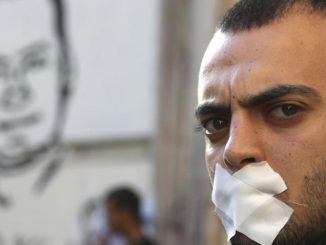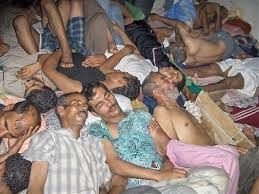
Abdel Fattah al-Sisi ratified on Monday (29 May) a new law that imposes severe restrictions on NGOs and human rights organizations operating in Egypt — a move, critics warn, that greatly expands the Egypt’s military dictator ever-widening crackdown on public dissent.
The new law requires local and international non-governmental organizations acting within Egypt to “agree with the state’s plan, development needs and priorities,” and to receive permission from a special regulatory committee before carrying out and publishing any studies or surveys.
Groups found violating these rules could face up to a maximum of five years in prison and up to $55,000 in fines, according to the new law.
In this context, Amnesty International released a statement saying that the new law ratified by al-Sisi imposes unprecedentedly harsh restrictions on NGOs could be “a death sentence” for human rights groups in the country.
In a statement, it called the law, signed by Abdel-Fattah al-Sisi, a day earlier, “a catastrophic blow for human rights groups working in Egypt.”
Najia Bounaim, the group’s North Africa campaign director,said “The severity of the restrictions imposed by this law threatens to annihilate NGOs in the country, at a time when the authorities’ escalating crackdown on dissent makes their work more important than ever.”
Last November, Amnesty called on al-Sisi not to sign it due to its conflict with Egypt’s constitution and international obligations. But the ratification, the group said, came without addressing any concerns raised by Egyptian or international human rights organizations.
Amnesty also said that just in the past week, repressive measures have intensified against voices critical of al-Sisi’s military-backed government.
last week, Sisi blocked at least 21 news sites he deemed unfairly critical of his government, including Al Jazeera,The Huffington Post and Egyptian online newspaper Mada Masr.
The law faced harsh international criticism when it was first drawn up and approved by Egypt’s Parliament in November 2016.
At the time, Maina Kiai, the United Nations special rapporteur on the rights to freedom of peaceful assembly and association, said the law would “devastate the country’s civil society for generations to come and turn it into a government puppet.”
Since taking power through a military coup in 2013, al-Sisi, the former Minister of Defense, has expanded his reach over nearly every aspect of Egyptian civil society.
In his first year, Sisi detained, charged, or sentenced, at least 41,000 people, according to estimates compiled by Human Rights Watch. In 2013, al-Sisi also enacted anti-protest legislation, which required demonstrators to give at least three days warning for gatherings of over 10 people and enabled security forces to postpone the demonstration as they saw fit.
At least 25 journalists continue to be detained in Egypt’s prisons and detention centers, according to the Committee to Protect Journalists (CPJ), making Egypt one of the worst countries on Reporters Without Borders’ press freedom index along with China.
In fact, the new law will impact 47,000 local non-governmental organizations operating in Egypt as well as the 100 foreign -funded groups — all of whom will have a year to comply with the new regulation or otherwise be dissolved.



